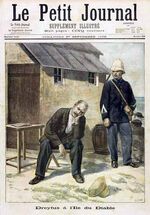
The Dreyfus affair was a political scandal that divided the Third French Republic from 1894 until its resolution in 1906. In December 1894, Captain Alfred Dreyfus, a Jewish officer from Alsace on the General Staff of the French Army, was convicted of treason by a military court for passing on military secrets to the Germans. Since the leaking of informaiton continued, the new chief of the French intelligence service, Colonel Georges Picquart, established that the culprit was not Dreyfus, but one Commandant Ferdinand Walsin Esterhazy. The army refused to reopen the case, and Picquart received a posting to Tunisia. His successor began to manufacture evidence to prove Dreyfus' guilt, but meanwhile so many questions had been raised in public that a trial of Esterhazy became inevitable. The latter's acquittal in a farcical trial spurred the famous novelist Emile Zola into actio. He attacked the army's actions against Dreyfus in an open letter under the title J'accuse ("I accuse") on 13 December 1898. Yet it was not until a change of President (Emile Loubet for Felix Faure) and of Prime Minister (Pierre Waldeck-Rousseau for Charles Dupuy) that a retrial became possible. In August 1899, Dreyfus was still found guilty, but "with extenuating circumstances", and his sentence was reduced to ten years. In response, Dreyfus received a presidential pardon, but it was not until 1906 that he was fully rehabilitated and reinstated in the army.
The affair revealed the deep anti-Semitism that had permeated every social strata in France and led to widespread disturbances at the height of the affair in 1898. For the following decades, it polarized French society, which had just begun to overcome its political divisions, into a right wing hostile to the Republic and supported by popular Catholicism, which rallied around anti-Semitism, and a left wing which had generally advocated Dreyfus' acquittal and which rallied behind the Republic.
